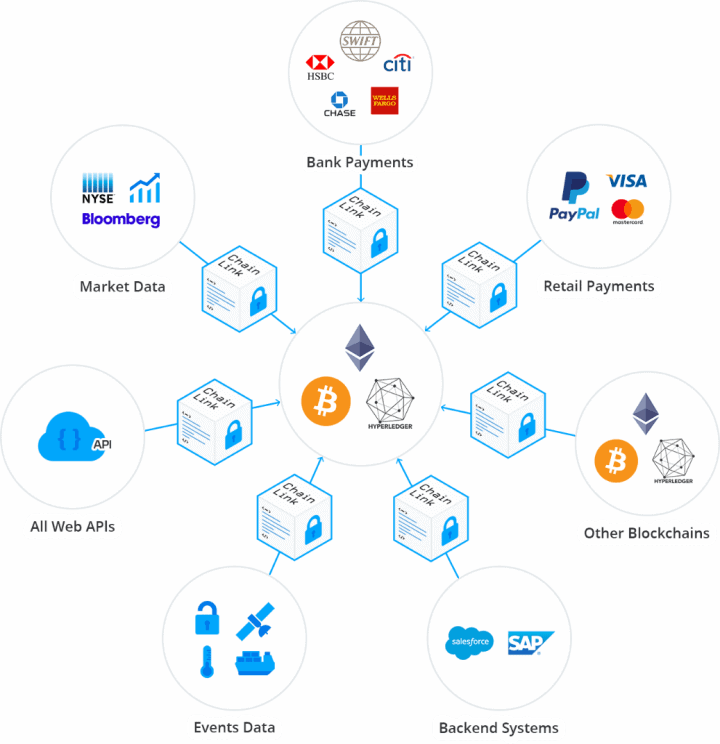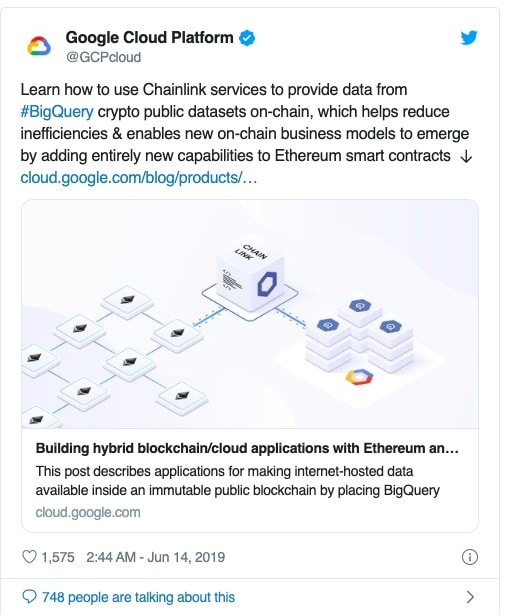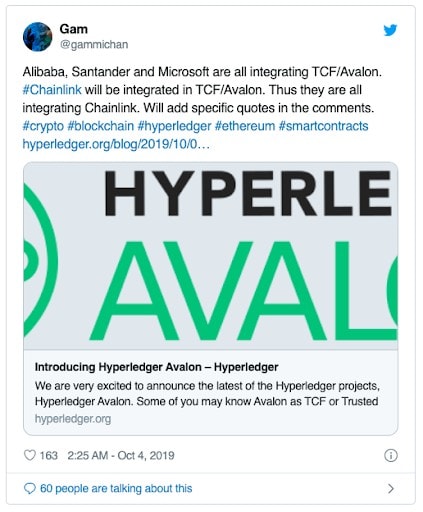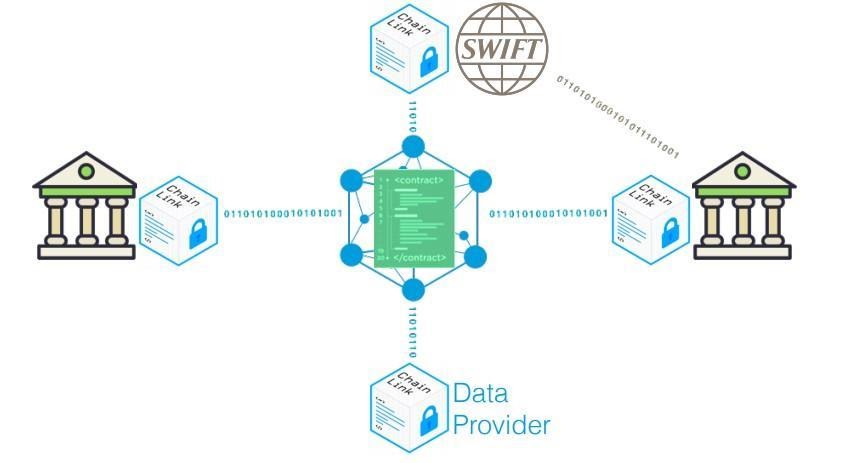What is Chainlink?
Bitcoin ushered in the era of decentralization. It allowed people to send money to each other in a trustless and decentralized way. However, it was limited to financial transactions.Next came Ethereum. Ethereum ushered in blockchain 2.0 through the creation of smart contracts. As a software platform, anyone could create applications on top of it and benefit from its decentralization. However, it’s limited to on-chain data which are data within the network. If you cannot work reliably with real world data, then it cannot be used by the majority of real world enterprises. This is called the Oracle problem which Chainlink is trying to solve.
Chainlink is a decentralized network of oracles. These oracles act as a bridge that links real world data into blockchain networks. This allows smart contracts access to off-chain resources such as data feeds, web APIs, and traditional bank account payments. This decentralized approach limits reliance on any single party which makes it a single point of failure. It is currently deployed on the Ethereum network since Ethereum is the most active decentralized software platform in the space with thousands of projects and developers building on top of it. However, Chainlink plans to make itself available in other blockchain networks as well.

LINK Token
LINK is the cryptocurrency that is used as a medium of exchange between those that use data and those oracles that provide the data. It is also used as a deposit/collateral by oracle providers to avoid misbehavior. It does not have its own native cryptocurrency but rather is an ERC20 token issued and used in the Ethereum network. It’s ICO was held back in September of 2017 raising $32 million dollars with an ICO price of around 10 cents. With a current price of around $3.5, it has already given a very generous return to its investors.
Chainlink Team
Chainlink was developed by a seasoned team of technology veterans. Sergey Nazarov is their CEO who worked at FirstMark Capital before getting involved in the cryptocurrency space. He is also the founder of tech company SmartContract, Secure Asset Exchange and CryptoMail. Steve Ellis serves as the company’s CTO having previously worked as a software engineer and team lead at Pivotal Labs, where he worked on securing sensitive HIPAA compliant data and building scalable payments automation software.
What sets Chainlink apart?
Chainlink is focused on a very specific problem, called the oracle problem, which all blockchain networks encounter. ChainLink offers a decentralized alternative by creating a network of decentralized oracles that can pull data from data pools, application program interfaces (APIs) and other real world sources. It opens up the possibility for smart contracts to use any data source at all. Real world data can now take advantage of the secure and trustless nature of blockchain and smart contracts. Although there are a few blockchain companies addressing this issue, Chainlink has had the first mover advantage and is already partnered with many other top blockchain projects as well as technology giants. Some of their notable partners include Oracle and their Oracle Startup Team, Hedera Hashgraph, Synthetix, and Matic.
It must be noted that Chainlink can also securely input data back into off-chain networks/databases on behalf of a smart contract. This closes the loop so even legacy systems can make use of blockchain systems without overhauling their entire system.

How does Chainlink Work?
Components of Chainlink: On-chain and Off-chain functions
Chainlink offers a simple on-chain contract data aggregation system, and a more efficient off-chain consensus mechanism. It also has supporting reputation and security monitoring services.
On-chain Functions
Chainlink has three main components to its on-chain architecture. First is its reputation contract which keeps track of oracle-service-provider performance metrics. Second is its order-matching contract whose main purpose is to take a proposed service level agreement (SLA), log its parameters, and collect bids from different oracle providers. Last is its aggregating contract which collects the oracle providers’ responses and calculates the final collective result of the ChainLink query. These three components act as a check and balance to optimize the results for the user. It tracks performances and penalizes bad oracles to provide the best results even with its decentralized nature.
Off-chain Architecture
The second part is ChainLink’s Off-chain architecture. These are oracle nodes that exist off-chain but are still connected to the Ethereum network (since Chainlink currently works only with Ethereum but does plan to expand to other blockchain networks as well). These nodes independently harvest responses to off-chain requests. Below are the components as outlined in the whitepaper.
- Chainlink Core — The core node software is responsible for interfacing with the blockchain, scheduling, and balancing work across its various external services.
- External Adapters — Beyond the built-in subtask types, custom subtasks can be defined by creating adapters. Adapters are external services with a minimal REST API. By modeling adapters in a service-oriented manner, programs in any programming language can be easily implemented simply by adding a small intermediate API in front of the program
- Subtask Schemas — ChainLink currently operates with a schema system based on JSON Schema, to specify what inputs each adapter needs and how they should be formatted.
How Chainlink can be used in Different Industries
- Money and Finance — The financial sector is one of the sectors where reliable data is most crucial. And in a heavily connected financial system, it can quickly lead to a domino effect. Securities smart contracts such as bonds, interest rate derivatives, and many others will require access to APIs reporting reliable market prices and market reference data (e.g. interest rates).
- Payment — Given that many banks have data that are very siloed, Chainlink allows smart contracts to connect and interact with these legacy banking systems. With Chainlink’s blockchain agnostic nature, it can also help bridge payments from one cryptocurrency to another, seamlessly and reliably.
- Enterprise systems — Developing enterprise systems is a very specific task which also gives it a high barrier to entry. Instead of replacing the system, it would be much easier to connect these to existing blockchain systems. Using Chainlink can connect legacy database systems to smart contracts. This not only helps improve existing companies but also allows new blockchain projects to easily onboard new clients.
- Government — With tamper proof records, governments and its citizens can finally achieve a more fair society. From voting, to public personal records such as citizenship, smart contracts can revolutionize society
Chainlink Partnerships
When it comes to partnerships, Chainlink is one that has already secured a lot of partnerships from both blockchain and non-blockchain related projects and tech companies.
- Google Cloud announced Chainlink as an official Cloud Partner. As part of this partnership, Google plans to use “Chainlink oracle smart contract” to establish a bridge between Ethereum-based smart contracts and its data warehousing and business intelligence solution — BigQuery.

- Chainlink has also teamed up with Intel, Hyperledger, and the Enterprise Ethereum Alliance to unveil the Trusted Compute Framework (TCF) later known as Hyperledger Avalon. The framework will help blockchains to significantly enhance the computational abilities while simultaneously catering to enterprise requirements for scalability and privacy. Members of this organization include tech giants such as Alibaba, Baidu, Consensys, IBM, Microsoft, and Oracle.
Chainlink’s specific role is to contribute to the TCF’s plans for how to integrate with decentralized oracles and attested oracles, which will be able to provide both TCF computations and various on-chain computations.

ChainLink’s partnership with the SWIFT banking transaction network could be it’s biggest one yet. SWIFT is one of the largest global financial networks, processing millions of financial transactions and success with them could lead to many other partnerships within the finance industry from banks to payment processors to insurance outfits.

Key Metrics
| May 2020 | |
| Price of LINK | $3.85 |
| Circulating supply | 379,509,559 LINK |
| Max Supply | 1,000,000,000 LINK |
| Active Bakers | 422 |
| Market Cap Rank | #14 |
Timeline
September 2017 – Chainlink held its ICO raising $32 million
Where can I buy LINK?
Best Chainlink Exchanges
How to properly store LINK?
Chainlink currently runs on the Ethereum network. This means that all LINK tokens are still using the erc20 token format. However when Chainlink eventually works with other blockchain projects, it will use the native address format of those blockchain networks.
Hardware Wallets – auto generated
Online Wallets – auto generated
Pros and Cons
Pros
- First mover advantage in the decentralized oracle space
- Support from big names such as Google, Binance and Oracle
Cons
- The number of available oracles is still relatively small
FAQ
Transaction Time
Blocks in the Ethereum network, which LINK is currently on, are produced every 13-15 seconds.
Transaction fees
Since Chainlink utilizes the Ethereum network, transaction fees are paid in ETH. Currently, average transaction fee is around 0.0007 ETH ($0.153 USD)
Block Rewards Reduction
There is no set block reward reduction since LINK is a utility token used as a form of payment.



